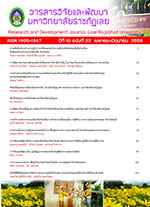การบริหารองค์กรปกครองส่วนท้องถิ่นเพื่อการสร้างความเป็นพลเมือง กรณีศึกษา เทศบาลเมืองเขาสามยอด จังหวัดลพบุรี
Keywords:
องค์กรปกครองส่วนท้องถิ่น, ความเป็นพลเมือง, local administration organization, citizenshipAbstract
การศึกษาครั้งนี้ มีวัตถุประสงค์เพื่อศึกษาลักษณะการแสดงถึงความเป็นพลเมืองของประชาชนในองค์กรปกครองส่วนท้องถิ่น และเพื่อศึกษาแนวทางการบริหารที่สามารถสร้างความเป็นพลเมืองได้ รูปแบบการวิจัยที่ใช้ในการศึกษาครั้งนี้ คือ แนวทางการวิจัยเชิงคุณภาพ โดยมีเครื่องมือที่ใช้ในการศึกษา คือ แบบสัมภาษณ์แบบเจาะลึก ผู้บริหารองค์กรปกครองส่วนท้องถิ่น บุคลากรองค์กรปกครองส่วนท้องถิ่น ประธานกลุ่มหรือองค์กรชุมชน หัวหน้าหมู่บ้านหรือหัวหน้าชุมชน ประชาชนในพื้นที่ และการสังเกตการณ์เกี่ยวกับการดำเนินโครงการหรือกิจกรรมขององค์กรปกครองส่วนท้องถิ่นผลการศึกษาพบว่า ประชาชนมีการแสดงออกถึงความเป็นพลเมืองด้วยการมีความพยายามและเรียกร้อง ให้เกิดการส่วนร่วมทางตรงเกิดขึ้น โดยเฉพาะอย่างยิ่ง ในการทำการตัดสินใจทางนโยบายสาธารณะ ประชาชนสามารถบูรณภาพความคิดกับการปฏิบัติในการพัฒนาชุมชนได้ พร้อมทั้งยอมรับความแตกต่างทางความคิด ไม่บังคับ หรือชักจูงผู้อื่น นอกจากนี้ ภาครัฐยังคงมีบทบาทสาคัญในการกำหนดคุณภาพและชี้ถึงระดับของกระบวนการมีส่วนร่วม
ในด้านแนวทางการบริหารที่สามารถสร้างความเป็นพลเมืองได้ การศึกษาพบว่า การบริหารงบประมาณแบบมีส่วนร่วม สามารถสร้างความรับผิดชอบต่อการปกครองได้ มีการเรียนรู้ถึงการต่อรองระหว่างพลเมืองด้วยกันและระหว่างพลเมืองกับรัฐ นำไปสู่การจัดลำดับความสำคัญของนโยบายและโครงการต่างๆ ที่เกิดจากการเห็นพ้องและยอมรับร่วมกันของสังคม ภายใต้ปัจจัยแวดล้อมทางด้านผู้นำ และความเชื่อมั่นระหว่างรัฐและพลเมือง
Local government administration for building citizenship Case study : Khaosamyod Town Municipality, Lopburi Province, Thailand
The purposes of this study were to study the citizenship characteristics in local government area and to study the building citizenship process. Qualitative research method was applied in this study by using in-depth interview for local government leaders and administrators, head of communities, and general people in the area. Moreover, observation was used to collect information.
The results of this research revealed that people showed citizenship characteristics by endeavoring and insisting direct citizen participation, especially public decision making. The people also made a completeness of thought and action in to community development. Moreover, people accepted diverse ideas without forcing or inducing others. Furthermore, public sectors still played an important role in setting and indicating of participatory process level.
In the aspect of the administrative process for building citizenship of this study, the results indicated that the participatory budgeting created self – governance responsibility. There were negotiation learnings between citizen and citizen as well as between citizen and public sectors. The results leaded to set the policy and project ranking from the whole social acceptance. There were two factors; leader and trust.
Downloads
Issue
Section
License
ข้อความที่ปรากฎในวารสารฉบับนี้เป็นความคิดเห็นของผู้เขียนแต่ละท่าน สถาบันวิจัยและพัฒนา มหาวิทยาลัยราชภัฏเลย และกองบรรณาธิการ ไม่จำเป็นต้องเห็นด้วยและไม่มีส่วนรับผิดชอบใดๆ
สถาบันวิจัยและพัฒนา มหาวิทยาลัยราชภัฏเลย ขอให้ผู้อ่านอ้างอิงในกรณีที่ท่านคัดลอกเนื้อหาบทความในวารสารฉบับนี้






